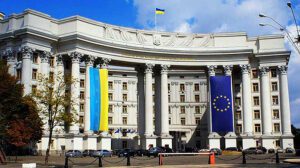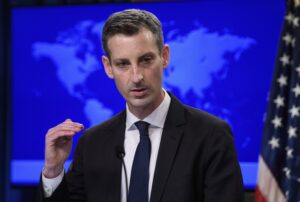
The talks with Russia have not brought the results desired by Ukraine just yet, Ukrainian President Volodymyr Zelensky said in a video address on Monday night.
“There is no result desired by us just yet. Russia declared its position, and we made an argument in order to stop the war. We received certain signals. When the delegation returns to Kyiv, we will analyze what we have heard and will decide how to proceed to the second round of negotiations,” Zelensky said.

Ukraine and Russia outlined certain decisions during the negotiations, Mykhailo Podoliak, adviser to the head of the President’s Office of Ukraine said.
“The Ukrainian and Russian delegations held the first round of talks today, the main purpose of which was to discuss the issues of a ceasefire on the territory of Ukraine and hostilities. The sides identified a number of priority topics on which certain decisions were outlined,” he said.
“In order for these decisions to get some opportunities for implementation, logistical solutions, the parties leave for consultations in their capitals. The sides discussed the possibility of holding a second round of negotiations in the near future, at which these topics will receive concrete development practice,” he said.
According to Russian presidential aide Vladimir Medinsky, the next meeting “will be held in the coming days on the Polish-Belarusian border, there is a corresponding agreement.”

The Ministry of Foreign Affairs of Ukraine (MFA) is withdrawing Charge d’Affaires for Ukraine in Russia Vasyl Pokotylo for consultations due to the recognition by Russia of the independence of certain regions of Donetsk and Luhansk regions that are not controlled by the Ukrainian government.
“Due to the adoption by the Russian leadership of unlawful decisions to recognize the ‘independence’ of the quasi-formations created by it in the temporarily occupied territories of Ukraine the so-called ‘Luhansk People’s Republic’ and ‘Donetsk People’s Republic,’ Charge d’Affaires of Ukraine in Russia Vasyl Pokotylo was summoned to Ukraine for consultations,” the MFA press service said on Tuesday.

Ukraine does not have too high expectations from the visit of German Chancellor Olaf Scholz to Ukraine, but this will be the first long substantive conversation between the German Chancellor and Ukrainian President Volodymyr Zelensky, where they synchronize their positions, with which the Chancellor will go to Moscow, Minister of Foreign Affairs of Ukraine Dmytro Kuleba has said.
“We are positive about the fact that Chancellor Scholz will visit Kyiv first, before visiting Moscow. We do not have any too high expectations, but this will be the first long substantive conversation between the German Chancellor and the President of Ukraine, where they really synchronize their position with which the chancellor will go to Moscow,” Kuleba said at a press conference in Kharkiv on Friday, answering a question from Interfax-Ukraine.
He stressed that Scholz’s visit to Ukraine is extremely important. “We hope that it [the visit] will exceed our expectations,” Kuleba added.

Issues related to Ukraine and Russia’s actions continue to be in the focus of the United States administration, regardless of where its employees are, US Secretary of State Antony Blinken has said.
“That remains front and center in what we’re doing and indeed what I continue to do even as we’re heading to Australia,” Blinken told reporters accompanying him to Canberra aboard the plane.
“I’ve been on the phone during a chunk of this trip talking to various counterparts with some focus on Russia-Ukraine. I spent some time talking to National Security Advisor Jake Sullivan as well,” he said.
“And this is part of, as we’ve tabulated, with foreign counterparts something like 200-plus engagements just in recent weeks – phone calls, video conferences, in-person meetings, where we have been working to coordinate all of our partners in standing up to this Russian aggression directed toward Ukraine,” Blinken said.
“We have been engaged in a two-track strategy where we have, on the one hand, been pursuing diplomacy, but at the same time building up strong deterrence to dissuade Russia from taking aggressive action,” the US Secretary of State said.

Washington is ready to welcome any option to de-escalate tensions on the border between Russia and Ukraine, State Department Spokesperson Ned Price has said at a briefing.
“De-escalation can take many forms. We would welcome any of it,” Price said, answering a question in what form Washington imagines the de-escalation of tensions.
In particular, according to him, the start of de-escalation could be considered both the withdrawal of troops from the border with Ukraine and the change in Russian rhetoric on the Ukrainian topic.